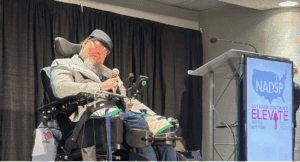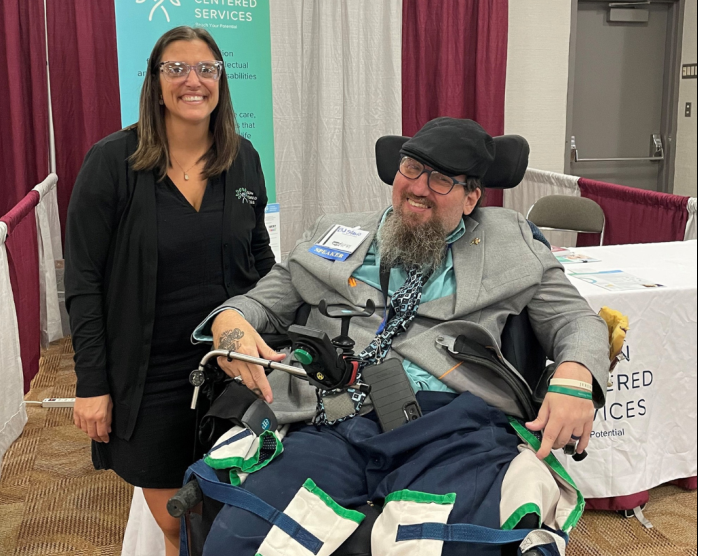BJ Stasio on Advocacy & Accepting the 2025 Hingsburger Humanitarian Award
“Making the world work for you: Sometimes it just takes active listening on both sides”
Disability Rights Advocate and Activist BJ Stasio is being honored by the National Alliance for Direct Support Professionals (NADSP) with the 2025 Hingsburger Humanitarian Award. The award recognizes BJ’s lifelong commitment to justice, inclusion, and the rights of people with intellectual and developmental disabilities. BJ’s leadership as a self-advocate, educator, and changemaker has shaped public policy, expanded voter access, and empowered countless individuals across New York State and beyond.
In addition to serving as board advisor for Self-Advocates of New York State (SANYS) and a peer specialist for the New York State Office for People with Developmental Disabilities (OPWDD), BJ has worked with LIFEPlan CCO NY and ACANY in shaping person-centered planning strategies.
 BJ’s work bridges policy, personal empowerment, and community transformation. We had the privilege of speaking with BJ about his advocacy journey, what receiving the Hingsburger Humanitarian Award means to him, and how he’s paving the way for the next generation of self-advocates and changemakers.
BJ’s work bridges policy, personal empowerment, and community transformation. We had the privilege of speaking with BJ about his advocacy journey, what receiving the Hingsburger Humanitarian Award means to him, and how he’s paving the way for the next generation of self-advocates and changemakers.
Can you share how your self-advocacy journey began?
“My journey of advocacy probably started when I was 16 years old. I protested the lack of access to a restaurant. It was right after the Americans with Disabilities Act was signed in 1990. It’s very interesting, when I tell the story and I think back to those times, I was just advocating for myself. I didn’t think about the effect of what I was doing would have on anybody else. I was just thinking about the advocacy I was doing for myself. I think as I got older, I realized that I needed to build allyship. Like with my staff and the people who I come in contact with. I have a large network of people now who I go to when I have an advocacy [concern]. Sometimes they come to me because they know I’m very well connected. So you need to build your own advocacy network in the community in which you live to make your advocacy work. Nobody can do advocacy by themselves.”
What does the Hingsburger Humanitarian Award mean to you?
“Well, I was shocked that people think I’m a humanitarian because I look at what I’m doing as just doing what I’m supposed to be doing to make my community around me a better place to live. And it turns out with all the national advocacy that I do, healthcare advocacy and other advocacy, it’s just kind of something I’m supposed to do, like I kind of look for injustice and try to fix it, because if I don’t start to fix it, it’s going to be worse for the next person. So to get the humanitarian award is great and the acknowledgement is great, [but] this award doesn’t come with only my blood, sweat, and tears and disappointment. It comes with the feelings of others, because my advocacy doesn’t happen without the support of many people. And even though I am a leader, you kind of have to be in the background sometimes as a leader and let other people show you the way. I don’t always want to lead. I want to be in the background cheering them on and helping them build their skills. This humanitarian award that I’m receiving is in honor of everybody who’s followed my lead and kind of found their own way to lead themselves.”
You’ve led incredible initiatives from healthcare reform to voter education. Is there a particular moment or achievement that stands out as especially meaningful to you?
“Well, it’s probably a couple small things, like getting the accessible Ferris wheel at an entertainment location in Buffalo is probably one of my things I’m most proud of, because all it took was a discussion with the establishment owner, and we have an accessible Ferris wheel for those with mobility needs. In my city of Buffalo, we didn’t have an ADA coordinator for a while, so I sat down with my councilman, and we wrote a resolution for the mayor’s office to create the position. So those are two things I’m the most proud of, probably because I see the fruits of the labor all the time, because I live in the community. The things that matter to me most are when I hear people who take the Ferris wheel for the first time, or I hear good things coming from the ADA coordinator’s office.”
What keeps you grounded and motivated in your work?
“My faith in myself and the faith that things could change if you always speak up and never be quiet. And yes, it’s exhausting to always speak up and never be quiet, but [it is worth] the rewards that come when you see the change that can be made.”
You have worked closely with LIFEPlan and ACANY in shaping person-centered planning strategies. In your opinion, why is it so critical that systems keep the individual at the center of their work?
“If you say you’re person-centered, you have to actually mean it. People just say it because it’s a buzzword, but you actually have to do it. Without the people that you’re working for and supporting, there would be no system. The more you do to help them have the life they want, the less you’ll have to do later, and the more they’ll engage in what they want for their life instead. Instead of being told what they want for their life, because so many people who receive services are kind of told that’s what they need to be doing.”
How do you encourage support professionals and care managers to build genuine relationships with the people they support?
“Just have a conversation with people. As I say, take a dialogue walk with them, get to know them as the people, not as the records. For me, I want them to get to know me as the person I am, not as the record they read. That is the key to actually being person-centered.”
You’ve supported the next generation of advocates through “Art of Advocacy” and other efforts that you’ve been involved in. What is some advice that you would give to young self-advocates just starting their journey?
“I would honestly say if you’re worried about making somebody mad, don’t worry about it, because maybe they’ll learn something along the way. It opens the door to a larger discussion of ‘why did you say that?’ or ‘what did you mean by that?’ Because it’s not just a one and done, because usually when you hear no, you give up. But I’m smart enough to ask, ‘why did you say no?’ if it doesn’t make sense to me. I want to know what we can do to turn the ‘no’ into a ‘yes.’
“And don’t be afraid to be who you are. Don’t apologize. Don’t ever apologize for being who you are. Because if you apologize for being who you are, you’re cheating yourself out of a good life.”
Do you have advice on how family members, friends, and the community can best support people with disabilities?
“Remember, they’re human beings and they belong in the communities in which they live. So they should be included whether they can speak or not.”
What message would you like to share with Care Managers, self-advocates, and families who are inspired by your story?
“Well, very simply, don’t be inspired by my story. Help people find their own story and be inspired by taking that journey with them.”
“I just want to live by example and hopefully somebody will take my example and say, well, if BJ did it, I should try it. And albeit my way can be a little different and a little uncomfortable, but that’s with intentionality. I’m not here to make people feel comfortable and all warm and fuzzy. I’m here to make them wonder. I’m just here to be me and have that good life the system promises me.”

